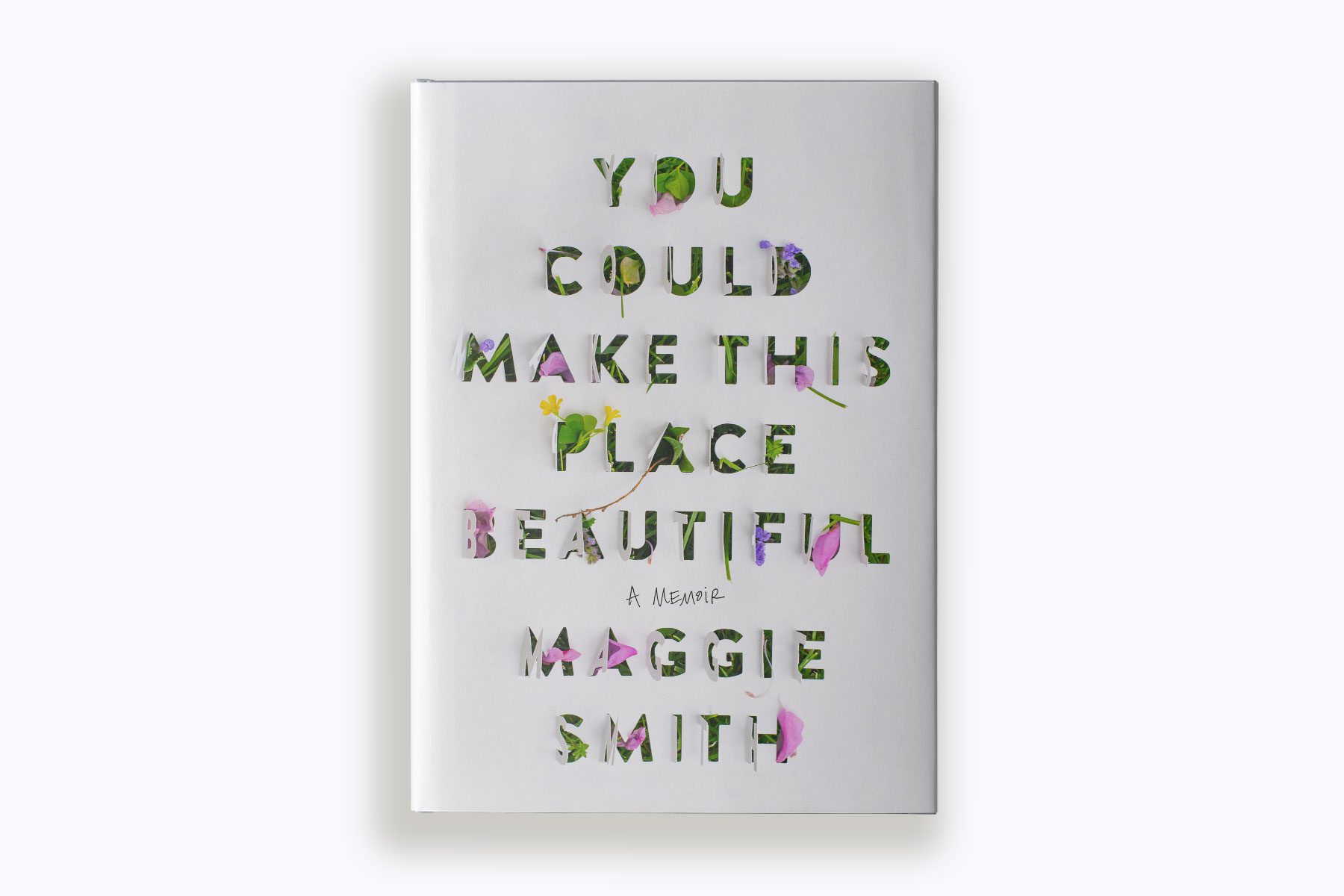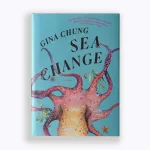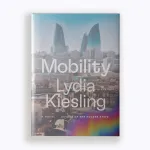Maggie Smith’s 2016 poem “Good Bones,” which published days after a gunman killed 49 people in Orlando’s Pulse nightclub, inadvertently rose to meet a terrible moment. The poem focuses on the inherent injustice that parents face with helping children navigate a world that Smith describes as “at least half terrible” while charged with the anger and responsibility of keeping them not only safe, but well. It ends with its narrator creating the analogy of a parent as a real estate agent, selling the possibility of the world — beneath it all, the bones are good.
“You Could Make This Place Beautiful” — the last phrase of the poem — is now the title of Smith’s latest book, a memoir about the end of her marriage to her husband and an interrogation of the gender roles that shaped it. Writing in search of answers, Smith considers what it means to be a good mother, a good wife and a good survivor of divorce — left to act as a steward to self and children in an imperfect world.
Smith spoke with The 19th about “You Could Make This Place Beautiful” and resisting the gendered definitions that come with motherhood, marriage and work.
This conversation has been edited for length and clarity.
Jennifer Gerson: This book is so specific. It’s not trying to be anyone else’s story or universalize divorce or marriage and what pain and grief mean. It wasn’t my life, but it really resonated with me. With that said, in writing this, who did you imagine this book is for?
Maggie Smith: It’s for you.
My hope for the book, and the people that I wrote the book for, are the people who might read it and say, “I feel seen,” or, “There’s something in this book that I know.”
My experience as a poet tells me that the more particular and specific I write, the more people see themselves in the work. It seems counterintuitive. I’ve heard it over and over through the years, but the poems and the essays and books that I write that are so specific to my experience, those are the stickiest things where there’s something in there that someone else says, “I have thought that,” “I have felt that,” “I have had that exact conversation,” “This reminds me of something I do with my kids.”
I’m always hoping that writing about my own very narrow experience somehow will have a sort of an aperture and then connect with other people who might feel some comfort or solace or permission or commiseration in these pages.
In this book, you talk a lot about the process of being allowed to acknowledge your feelings of unhappiness in your marriage. Why do you think that women specifically need what you just described — that permission of being allowed to have feelings?
I think still today a lot of these kinds of conversations are happening behind closed doors and they’re being siloed. So, maybe this is something you would say to your sister, but you wouldn’t say to your mom. Or this is something you would say to your mom, but you wouldn’t say to your husband. I think women are having very quiet one-on-one conversations with each other all the time, texting a friend asking, “Why if we are both working from home am I the one doing all of the homework help?” or, “Why is it my office door that is knocked on when someone needs a slice of apple?”
-
More from The 19th
- ‘House of Cotton’ uses horror and fairy tales to weave a story of abortion and Black women’s lives in the South
- Photojournalism is dominated by men. Women Photograph seeks to change that lens.
- Lorraine Hansberry’s family says Chicago’s racist policies seized their land. Now they’re seeking reparations.
Do you think women are expected to hold guilt for deviating from this template in any way, especially in mothering?
There’s the term “mom guilt,” but there isn’t actually a word for “dad guilt,” because that doesn’t exist. By and large, men are expected and encouraged to have lives outside the home and prioritize their careers. I see it all the time. I talk to my friends about this, even my male friends, that if the dad is the one to do the doctor’s office visits or volunteer at the school function, everyone goes, “Wow, you’re so involved.” If they’re pushing the stroller, people say, “Wow, he’s such a hands-on dad.”
What’s a hands-on mom? That’s just a mom, right?
Part of writing this book for me was about asking what does it mean to be good? What does it mean to be a good wife? What does it mean to be a good mother? How can we be equally good at all of these things and in all of these ways? It’s like being a four-season athlete.
I still think there’s a lot of what has been passed down to us, and that is a level of self-sacrifice that is expected of women and mothers that is not expected or encouraged in men. Women are culturally rewarded for being self-sacrificing.
Do you see shame as functioning differently than guilt in how mothers are supposed to perform their identities for others? Is there this expectation to not only feel guilty, but to feel ashamed by your inevitable inability to be all things for all people?
I’m not sure if we’re publicly really allowed to hold any of this.
If you feel bad for traveling for work because you’re leaving your children — or even just going to the office and having someone else watch your kids — I think that is what is expected of us. If we don’t feel bad, then we’re told we are disconnected and that something is wrong with us, that we’re not caring or we’re not nurturing enough.
My son said something about feeling embarrassed once when he was in preschool; I wrote about this in “Keep Moving.” I asked him what he thought the word “embarrassed” meant, because I thought maybe he got the wrong word. Like, why would a 4-year-old feel embarrassed? He said, “It means scared,” and I thought, “Oh right — of course it does.” Because when you’re embarrassed, it’s because you’ve been caught being imperfect.
That’s where the shame comes in. You’ve been caught being imperfect, and guess what? We all are. So we might as well just give up that feeling of embarrassment now. There’s only so much tap dancing and ball juggling we can do to try to stave that off, but when push comes to shove we can’t actually be all things to all people. I think as women, we’re not in a place yet where that’s OK. That’s not the message we are getting.
Your own divorce drives the narrative of this memoir. How do you think that same dynamic of fear and shame plays out for women when it comes to talking about divorce? Do you think women feel a kind of pressure to always articulate divorce as a sense of failure in relationship to womanhood?
That’s the exact word I was going to go to right now. It’s either a “failed marriage” or a “successful marriage.” Again, I think this is rooted in the idea of marriage as an achievement, especially for women. I think about this all the time that when people get engaged, the most common reaction is, “Congratulations!” — it’s as if they’ve won a trophy of some kind. And when people announce divorces, the reaction is often, “I’m sorry.”
Now, that may be an appropriate reaction if the person is expressing a lot of grief and sadness over it, but it may not actually be the appropriate reaction for everyone. They might see it as liberating. They might see it as amicable. No condolences required there.
I do think especially as women, our interpersonal relationships are so bound up in how we see ourselves, and see ourselves in relation to goodness. These relationships are defined by goodness, and not by what we achieve individually. So given that, to be a successful woman, what does that then look like?
Ensuring that your children come to understand gender, marriage and boundaries differently than you did is a focus throughout this book. How do you think about what it means to teach our children how to understand success in relation to gender?
I think a lot about what template we are offering our children.
Studies have shown that kids see more than we think they do. They are also taking in everything, so even if they’re not having the same discussion we are having about gender roles, they’re taking it all in and absorbing it. That’s something I think about all the time in how I parent them. What am I modeling about gender as a parent?
But I also ask myself what am I modeling about the way I treat my work, and what do I let them see about how I prioritize my work?
You ask in the book itself if your children will choose to read this memoir one day. What do you hope they will one day say when they talk about you and your work and what your work means in relation to who you are?
What I hope they are absorbing and what I hope that they’re receiving is a mother who is a whole person. That’s important to me because I want them to be whole people.
I think my kids know that they’re first for me and that my always allegiance is to them. But that doesn’t mean that I don’t ever have to leave the house. It means that sometimes I do have to go and do something. It doesn’t mean I wouldn’t love to go to the park, but I do have a deadline. Or it means I would love to not be gone for a week, but I do have a book coming out.
I can’t be in two places at once. We haven’t quite figured that out yet. So what I hope they see are examples of wholeness and being able to find joy in various aspects of life.
I want this not just for my daughter, but also for my son. I want them to think about the kinds of expectations that they’re going to bring to a partnership in their adult life. I certainly don’t want to be modeling to them a sort of service provider mother and a working father. I don’t want them thinking that’s the way it is.
We started off by talking about who this book is for. But what do you hope people will talk about after having read this book?
I hope people have what may be difficult conversations, and not just with their friends but with their partners. Maybe if they’re not married, they’re having these conversations with their boyfriend or girlfriend and asking, “What are we building here?”
When a marriage is over, it’s too late to do that sort of post-mortem. So I hope some of those conversations will happen for other people — and I hope that men are having them too. Change isn’t going to happen if it’s just women talking behind closed doors to other women about how frustrated they are.
It should not be revolutionary in 2023 to be talking about marriage and divorce and invisible labor and the mental load. I think this is all incredibly old news. I don’t know why it seems at all shocking or revolutionary. I don’t think there’s anything too surprising to be had in any of these conversations. The surprising thing is that we’re not having them more often.
Smith’s recommended reading
For more books on women exploring their identity through their relationships and breakups, here are a few Smith recommends.
“Heartburn” by Nora Ephron
After I finally read Nora Ephron’s Heartburn, I joked to my agent on the phone, “Why didn’t I think to do that? Why didn’t I think to novelize my life?” It would’ve been less vulnerable, less complicated than writing this book.
“All About Love” by bell hooks
I love seeing this feminist classic back on the bestseller list. Hooks will make you rethink your notions not only of love, but also of friendship, and community.
“Aftermath: On Marriage and Separation” by Rachel Cusk
I admire all of Rachel Cusk’s work but particularly this book which is a transformative read for anyone going through a big breakup.






